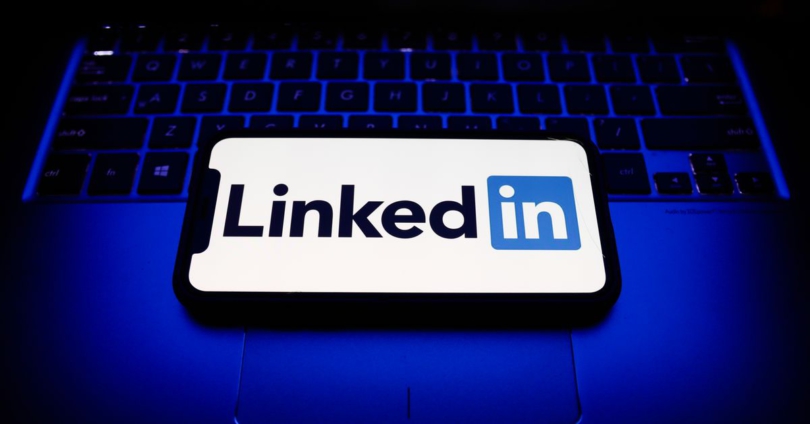Career-networking site LinkedIn has told Australian lawmakers it is too dull for kids to warrant its inclusion in a proposed ban on social media for under 16-year-olds.
"LinkedIn simply does not have content interesting and appealing to minors," the Microsoft-owned company said in a submission to an Australian senate committee.
The Australian government has said it will introduce "world-leading" legislation to stop children from accessing social media platforms.
But companies behind some of the most popular platforms with young people - Meta, Google, Snapchat-owner Snap Inc. and TikTok - have all challenged the planned law in submissions made to lawmakers.
Prime Minister Anthony Albanese has said the proposed law is to address the harm social media was inflicting on Australian children.
He said it was for "the mums and dads" who like him were "worried sick about the safety of our kids online."
Other countries are closely watching what happens with the legislation with some - including the UK - saying they are open to following suit.
Australia's Senate Environment and Communications Legislation Committee gave respondents one day to comment on the bill, which would amend its existing Online Safety Act.
Its report to the Senate concludes the bill should pass - providing its recommendations, such as engaging young people in the legislation's implementation, are considered.
'Significant concerns'
However, in their responses, the world's biggest tech firms have been setting out why they are unhappy with the proposed law.
Google - which owns YouTube - and Instagram-parent Meta have said they needed more time to consider the legislation.
Meta said its current form "will fail to achieve its goal of reducing the burden on parents to manage the safety of young people on social media".
It also claimed it "ignores the evidence" presented by child safety and mental health experts - a view shared by Snapchat in its own submission.
X (formerly Twitter), meanwhile questioned the legality of the bill's proposals.
TikTok Australia said it had "significant concerns" with the bill as proposed.
Like other platforms commenting on the legislation, it said it "hinges" on an ongoing age assurance trial looking at technologies that can effectively check user age.
Ella Woods-Joyce, director of public policy for TikTok Australia and New Zealand, wrote in the company's submission that the bill's "rushed passage poses a serious risk of further unintended consequences".
But LinkedIn has adopted a different approach - arguing in its submission that is a platform which is simply not of any interest to children.
Its minimum age requirement of 16 means they cannot access it, the company said, adding it removes child accounts when found.
If LinkedIn can successfully argue it should not be included in the legislation it will potentially avoid the cost and disruption involved it introducing additional age verification processes to the site.
"Subjecting LinkedIn’s platform to regulation under the proposed legislation would create unnecessary barriers and costs for LinkedIn’s members in Australia to undertake age assurance," it said.
Interest elsewhere
The Australian government has said it wants to bring in the legislation before the end of the parliamentary year.
But experts have said the bill's timeframe and current composition fail to provide an opportunity for adequate scrutiny.
Carly Kind, the country's privacy commissioner, said in a LinkedIn post on Monday after appearing at a public Senate hearing that she was concerned by "the widespread privacy implications of a social media ban".
Human rights commissioner Lorraine Findlay called the one-day window for submissions of responses to the legislation "entirely inadequate" in a LinkedIn post on Thursday.
"We need actual consultation, not just the appearance of it," she said.
Nonetheless, the Australian government's plans have sparked interest elsewhere.
In the UK, the technology secretary, Peter Kyle, told the BBC this month that similar legislation was "on the table."
France has already introduced legislation requiring social media platforms to block access to children under 15 without parental consent- though research indicates almost half of users were able to circumvent the ban using a simple VPN.
Latest Stories
-
Expelled South African envoy accuses Trump administration of racism
19 minutes -
Local Government Minister proposes sanitation levy to address Ghana’s waste management crisis
8 hours -
Central University Vice Chancellor calls for Fee Voucher System to support private universities
8 hours -
Heritage Month Cooking Competition showcases Ghana’s culinary richness
8 hours -
T-bills undersubscribed for 2nd consecutive time by GH¢1.5bn
10 hours -
His finest hour yet: The Bawumia concession and lessons in leadership
10 hours -
EC reschedules nomination for Nkoranza North and South District Level Elections
11 hours -
Energy Minister must recover stolen ECG containers or be held accountable – Ntim Fordjour
11 hours -
CLOGSAG suspends strike over Births and Deaths Registry appointment
11 hours -
Ing. Ludwig Annang Hesse is new president of GhIE
12 hours -
One artiste can’t take Ghana to the top, we must collaborate – Edem
12 hours -
Presidency hasn’t ordered NIB to investigate Akufo-Addo’s travels – Felix Kwakye Ofosu
12 hours -
Edem explains how 2023 motor accident made him lose gigs
12 hours -
Smoke detectors and modern technology: A game-changer in Ghana’s fight against market and home fires?
12 hours -
Provisional results for 2025 WASSCE First Series released
12 hours

